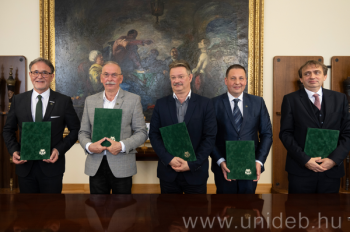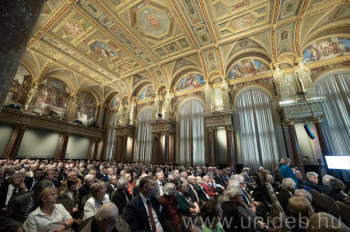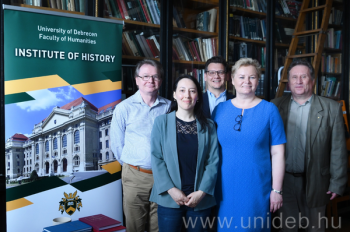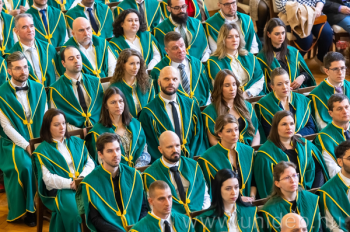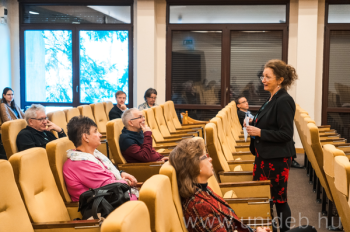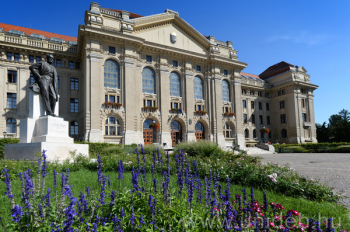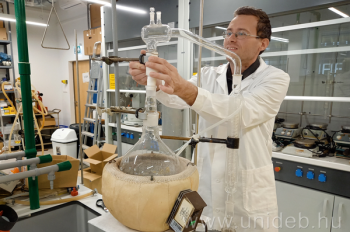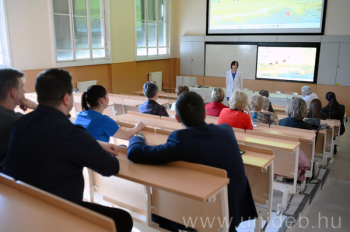Doctoral students who have been awarded GTIDEA Kiválósági PhD Ösztöndíj [GTIDEA Excellence Ph.D. Scholarship] could get acquainted with world-renowned oncology researcher Rene Bernards and his experiences of a career in research. During the course of Professor Bernards' visit to Országos Onkológiai Intézet [National Institute of Oncology], which occurred in the framework of a program coordinated by the international organization EURACAN, the young scientists were also informed about the latest developments and research trends in oncology.
New academicians were elected and announced at the 199th General Assembly of the Hungarian Academy of Sciences (MTA). Five professors of the University of Debrecen (UD) were elected to act as corresponding members, while four of the hitherto corresponding members became full members of the Academy.
An international network of research groups led by the University of Debrecen has won funding to develop a new type of drug that is hoped to bring breakthroughs in the chemotherapy treatment of cancer. The NextNano4Cancer project brings together experts from Taiwan, France, Spain, Romania and Hungary.
The Institute of History of the Faculty of Humanities of the University of Debrecen (UD) and the Department of Military History of the Nicolaus Copernicus University of Toruń recently hosted a joint conference for the first time under the title Modern History Symposium. The symposium provided an opportunity for specialists in modern history to present and share the latest findings of their research efforts.
New solutions for the automated classification of cervical cell images were developed by experts from some of the world's best universities at a scientific competition held in Houston by researchers from the University of Debrecen, Eötvös Loránd University and the University of Göttingen. By the end of what is called Pap-kenet Sejtosztályozási Kihívás [Pap Smear Cell Classification Challenge], as many as ten research teams completed their papers presenting their own solutions.
The Department of Surgery of the University of Debrecen Clinical Centre organized a symposium entitled Robotic Surgery for Everyone (Robotsebészet mindenkinek) on the experiences gained since the launch of the Robotic Surgery Centre last April. The event, held at the Headquarters of the Debrecen Regional Committee of the Hungarian Academy of Sciences (DAB), was dedicated to a discussion of the place, role and results of robot-assisted surgery in clinical practice in Debrecen, including an overview of the particularities of each medical specialty.
As many as 96 newly-hooded Ph.D.-s of the University of Debrecen (UD) took their oath and received their PhD degrees last Saturday. The titles habilitated doctor and the awards Count István Tisza Foundation for the University of Debrecen - University of Debrecen Publication Awards (Gróf Tisza István Debreceni Egyetemért Alapítvány (GTIDEA)–Debreceni Egyetem Publikációs Díj) were also conferred and presented at a ceremony in the venue called Aula of our Main Building.
The 5th Music Pedagogy Conference in Debrecen provided an opportunity for researchers, performers and teachers of music, musicology and music education to exchange ideas, learn about and discuss new research.
The Faculty of Agriculture, Food Science and Environmental Management and the Faculty of Science and Technology will host an international conference this year as part of the Debrecen University Symposium. The University of Debrecen (UD/DE) Scientific Council decided on the winners of the competition at its meeting last week.
Ghanem Amr Sayed, Assistant Professor at the Department of Health Informatics, Faculty of Health Sciences, DE, has investigated the impact of sociodemographic and lifestyle factors on oral hygiene in his research, which was awarded the Publication Prize of the Gróf Tisza István Foundation for the University of Debrecen. A survey of the Hungarian population found that gender, education and dental treatment also play a role in oral hygiene.
Novel drug candidate compounds, which are currently unique in the world and likely to be effective in the treatment of malaria, have been produced at the Faculty of Pharmacy of the University of Debrecen. The outstanding achievement of the researchers involved has been recognized by a publication award by Gróf Tisza István Debreceni Egyetemért Alapítvány [Count István Tisza Foundation for the University of Debrecen].
In Hungary, around 10,000 new cases of lung cancer are diagnosed every year and around nine thousand people die from the disease, even though there is a good chance of curing lung cancer if it is detected at an early stage. The latest research findings and state-of-the-art treatment options for lung cancer were discussed at a professional symposium held on Monday at the Pulmonology Clinic of the University of Debrecen Clinical Centre in connection with World Cancer Day.


